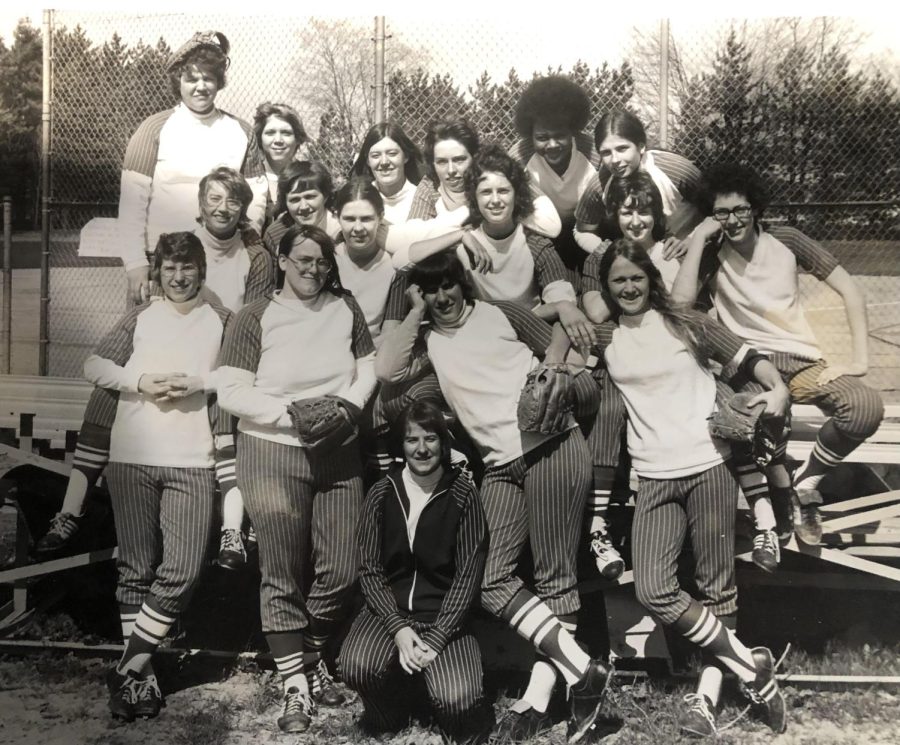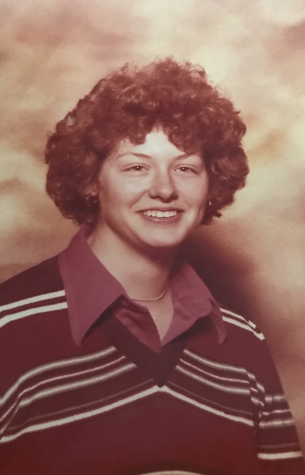Lorin Cartwright, former Pioneer Athletic Director and Athletic Trainer spent years of her career dedicating herself to upholding Title IX values in her work for AAPS.

By Community High School senior Kurt Hausman
Originally published in the CHS Communicator on January 23, 2023
For former Pioneer High School (PHS) Athletic Director, Lorin Cartwright, Title IX has been the mark of a standard– one that she has fought to uphold her entire life.
Cartwright had just finished her sophomore year of high school when Title IX was put into effect in June of 1972.
“Title Nine was introduced as an educational legislation,” Cartwright said. “It was really all about education and making sure that young women got the education they needed, so that they could be contributors to society in a different way. It had nothing to do with sports, it was an entitlement to education. That was the paramount issue.”
Soon after legislation had passed and acts of enforcement had taken place, Cartwright began to see changes in not only the educational landscape of her school, but the athletic side as well.
“What people discovered was that there were no girls sports,” Cartwright said. “In the 1960s, there were no girls sports in middle school and no girls sports in high school. Then when Title Nine passed, that’s when there was starting to be an array of sports being offered.”
Cartwright jumped at the opportunity to participate in the athletics that were offered to girls at her high school: basketball, softball and swimming. She played on both the girls basketball and softball teams in her junior and senior years of high school.
Cartwright then moved on to college at Grand Valley State University. She continued her involvement in the athletic programs offered to her, but still found similar issues as she encountered during high school.
“Early on [following the passing of Title IX], even though there were [athletic] opportunities for young women such as myself, there were nowhere near the same amount of opportunities as the men,” Cartwright said. “When I left high school, I had three sports. When I got to college, I think there were five.”

Cartwright continued on in her involvement in athletics even past her playing days. During her time at Grand Valley, she became an exceptional student athletic trainer, working alongside many of the men’s sports teams.
“I had enough skill set to be the head of the student trainers,” Cartwright said. “I worked with the men’s football program and the men’s basketball program. I was left alone with those teams on a fairly regular basis because [the head trainers] had a lot of faith in me.”
When Cartwright was first hired at PHS to become the head athletic trainer, she participated in internship work at the University of Michigan (U of M), where she was met with discrimination from coaches and staff.
“We were relegated to an area that was less than acceptable for women athletes, let alone athletic trainers,” Cartwright said. “We could not work with the football program there because [former U of M football coach] Mr. Schembechler felt that it was too difficult for the young men on the sideline to focus. So women were seen as disruptive for the football players.”
Cartwright is glad to see that significant progress has been made since her days as a trainer, but she hopes that women will not stop fighting for better treatment.
“I’m not advantaged because I’m a female, so I want to be equal with a man,” Cartwright said. “The only way that’s going to happen is if women continue to be persistent. To not settle, to stick up for themselves, demand better treatment and that men who are in power become allies of those women and start that movement and give opportunity.”
Cartwright wants to see the presence of women coaches in male sports increased, specifically the more popular sports, such as football and basketball. She pointed to U of M female graduate assistant coach Milan Bolden-Morris as an example of progress she would like to see more of in the future.
“I would love to see women coaching men’s sports,” Cartwright said. “That sort of thing would really break the glass ceiling. [Current U of M Head Coach] Jim Harbaugh interviewed [Bolden-Morris] and said: she’s all about football– she’s in.”
In 1995, Cartwright became the Athletic Director of Pioneer. She began tackling issues of inequality with Title IX from an administration standpoint. Much of her work was ensuring that Pioneer was abiding by the ‘three prongs’ of Title IX; standards that the school must uphold to ensure fair treatment.
“[The three prongs] are making sure that we have the parity,” Cartwright said. “The three prong rule in Title Nine means you have to meet one of the three rules to be federally in line with Title Nine. It doesn’t matter which one you meet, you just have to meet one.”
“I would love to see women coaching men’s sports. That sort of thing would really break the glass ceiling.”
_ Lorin Cartwright
The three prongs are proportionality, program expansion and accommodation. Proportionality means that there has to be equal opportunities for participation in both men’s and women’s sports, with respect to enrollment. Continued expansion means that there has to be a history or proof of progress to increase programming for the underrepresented sex. Accommodation means you accommodate the underrepresented gender by offering sufficient funding and availability for a team as well as sufficient competition in their geographic area.
During Cartwright’s time at PHS, she made sure that the athletic department met the prong rule under test number two. Pioneer would hold an event where they would survey the students in order to find out what sports people wanted and let people create club sports to attempt to fulfill the needs of those that were underrepresented.
“We would collect all these forms that talked about the kinds of sports that people wanted to have and didn’t want to have,” Cartwright said. “[Using those] we could make an assessment using that to try to determine if we could meet the needs of the underrepresented sports.”
Cartwright was faced with challenges in her efforts to uphold Title IX values and she realized that there were many issues in high school athletics due to funding inequities, some of which she had no control over, but was held responsible for.
“If a woman is valuable because they run a program, then they should get proper funding accordingly,” Cartwright said. “It really should be an equal opportunity. One issue is that funding also includes the money that your booster club spends. I am not as an athletic director privy to a private [booster club] account that I don’t have any say over. The money that is spent on those teams wherever the boosters see fit, is in actuality going to be counted against me and I don’t have any control over that.”
Cartwright highlighted the importance of the voices of young athletes in the fight for equality in sports; how even though change has been made, the fight is far from over.
“We need to have young people advocating on behalf of women,” Cartwright said. “‘Why can’t they officiate? Why can’t they be my coach?’ – They can. You give them that respect and that’s when the movement progresses. Young people are the answer to the question.”
About the writer:

Kurt is a senior at Community and is entering his third year on staff, his first as the sports editor. His favorite part about journalism is writing about high school sports in the Ann Arbor community and being able to hear people’s stories. When he’s not writing he is playing football as a captain of the Ann Arbor Pioneer Varsity Football team, spending time outdoors with his friends, exercising, or working his part-time job at Stadium Hardware.
To view more of Kurt and his peers work, click here.

Be the first to comment